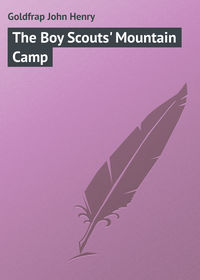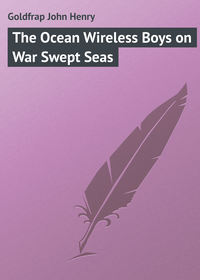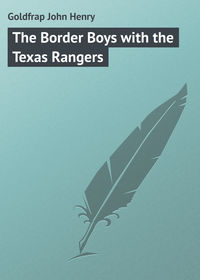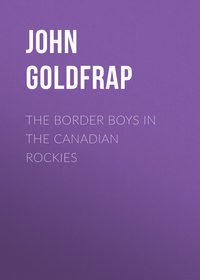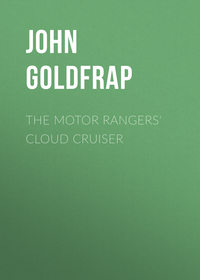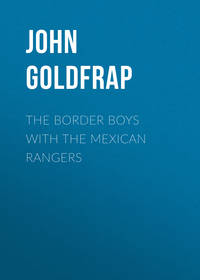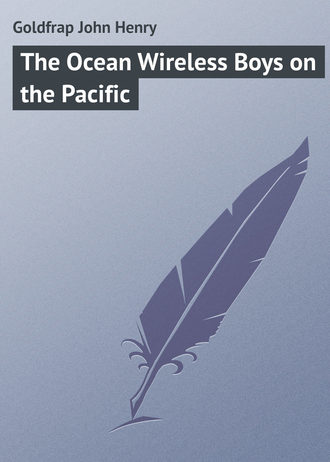 полная версия
полная версияThe Ocean Wireless Boys on the Pacific
“We had better look for some safe place to stay before it breaks,” counseled Captain Sparhawk. “A hurricane in the jungle is a serious matter. Trees are rooted up and struck by lightning and in the forest it is very dangerous for anyone to be caught by such a storm.”
“Me findee place,” said Salloo, and struck off down a dim trail leading toward the river. “Follow me, evelybody, and hully up.”
They needed no urging. The gloom and quiet of the forest was overawing. It had begun to get on their nerves. Under Salloo’s guidance they soon found themselves at a great mass of rocks on a high bank overlooking the river. The great masses of stone were piled in such a way that the crevices among them formed regular caves.
“We getee in here,” said Salloo, indicating the largest of them. “I send my men in annuder one.”
“I’m not going in there,” declared Donald, “there might be snakes or wild beasts inside.”
“You’d better come in or be blown away,” said Captain Sparhawk.
He had hardly spoken, before the storm broke in all its fury. Donald, with a cry of alarm, followed the others into shelter.
“Gracious, this beats anything I ever saw, even that storm off the Pamatous,” shouted Jack, above the shrieking of the wind.
“Him blow more big bimeby,” said Salloo, “him big storm this. You see.”
The trees swayed violently, and before long, from their shelter, they saw a big one torn up by the roots and hurtled from the bank into the river. The wind grew more violent. The dark air was filled with flying branches, leaves and sticks. Birds, large and small, were swept by, powerless to contend with the furious gale. Donald was crouched back in a far corner of their shelter, too frightened to do anything more than mumble and whimper.
The river began to rise and add its mighty voice to the other sounds, although no rain had yet fallen where they were. The darkness increased, but suddenly everything was lit up in a livid glare that made them all blink.
“Lightning,” exclaimed Salloo, “now him comin’.”
Then down came the rain. It literally fell in sheets, blotting out everything like a fog even when the constant flashes illuminated the scene. The water began to pour into their shelter from above, making it a very uncomfortable place. Soon the water was up to their knees and in the cave occupied by the carriers the men stood upright with their burdens on their heads to keep them out of the water.
“Gracious, I never saw so much water come down in my life,” exclaimed Jack. “It’s a regular – my!”
There had come a flash, a red ribbon of flame, so blinding that for an instant they could not see. It was followed by a crack of thunder that seemed to have split the sky. Donald gave a yell of alarm.
“Him hittee something close by for sure,” declared Salloo. He was right. Presently they saw a tall ceiba tree burst into flame like a torch. Fanned by the wind, it blazed fiercely even in the downpour. Its red glare lit up their faces in a ghostly manner, for it was not more than a few feet from their place of refuge.
“My, this is awful,” muttered Raynor. “Thank goodness we got out from under those trees in time.”
“Amen to that,” said Captain Sparhawk solemnly.
It rained for the rest of that night and in the morning they were sorry-looking objects. Everything was wet, and although they had tried to light a fire during the night, after the first violence of the storm had abated, they had not succeeded. But when, shortly before noon, the sun did come out, it shone down with a heat that made the whole wet earth steam. Clothes were spread out on the rocks to dry, as was the rest of the outfit. Fortunately, the bags the carriers bore were mostly of waterproof material, so not much damage was done to the contents.
It was a scene of havoc on which they gazed. The river ran high and its surface was littered with the bodies of dead monkeys, snakes, great trees torn up bodily, and other debris eloquent of the violence of the hurricane.
All round them lay big trees and the bodies of countless birds that had been dashed to death. It was some time before Salloo could persuade a fire to burn, but among the rocks, in crevices the rain had not penetrated, he found old dried leaves and sticks which made capital kindling and at last they cooked a hot meal, in need of which they all stood badly.
Then it was off on the long trail again. Late that afternoon, just as they were making camp, a party of natives came along the trail. They carried the skins of numerous beautiful birds that they had brought down with their blow-pipes. They were friendly and the boys bought some of the skins. Afterward Salloo had a long talk with them and, this being concluded, they kept on their way while our party went on with its preparations for spending the night.
Salloo had some news to disclose, he said. The natives he had been talking to knew the Kini-Balu Mountains well and told him, after he had described the cave they were looking for, that it was a very bad place. Nobody liked to go near it.
“On account of the Kini-Balus?” asked Mr. Jukes.
“No, on account um ghosts,” rejoined Salloo; “ghost of Taratao, old-time chief of Kini-Balus haunt him.”
“Begorry, so long as the ghosts ain’t got a punch it’s sorra a bit I care for ’em,” declared Muldoon valiantly.
That evening Salloo had a novelty for supper in the form of the flesh of a huge lizard, or iguana. At first the boys and their companions did not want to touch it, for in life it had been a hideous looking monster. But being pressed by Salloo, they consented, and found it very good eating. Its flesh tasted like chicken, though even more delicate.
It was about an hour after the meal when they were preparing for bed that Jack complained that he was feeling poorly. He said he had a headache and a feeling of vertigo. The others then admitted experiencing the same symptoms. Nausea soon succeeded these and ere long they were all convinced that they had been poisoned by eating the iguana. The natives, who camped some distance off with Salloo, experienced no such illness but then they had eaten none of the iguana which, to Captain Sparhawk’s mind, made it all the more certain that it was the giant lizard’s flesh that had made them ill.
Salloo was called from the native camp and bitterly reproached for inducing them to eat it. He protested that it could not have been the iguana that had made them ill. Had he not himself eaten it? But in the end he returned to the native camp with his head hung down, completely crushed by what he deemed the injustice of his white friends in blaming him for their illness. At first they were not greatly alarmed, not deeming it possible that they had actually been poisoned, and Captain Sparhawk administered remedies from the medicine chest. But, to their alarm, instead of decreasing in severity, their sufferings grew more acute as the night wore on.
Their ideas became confused, and as in sea-sickness in an acute stage, they lay about, not caring whether they lived or died. If they tried to rise, their heads swam, their feet tottered. Thus it was that Salloo found them in the morning when he came from the native camp.
The faithful fellow was seriously alarmed and set up a mighty wailing which soon brought his followers running over. But the sufferers only turned dull eyes upon them and moaned in their pain. Plainly they were in such a serious condition that unless something was done soon to relieve them, death itself might put an end to their misery. Salloo looked about him wildly, hoping to catch some solution to the mystery of this sudden illness. He raised his eyes upward and his lips moved as if he were invoking the aid of some heathen deity.
But suddenly the expression on his countenance changed. His eyes were fixed on the leaves of a tree under which the sufferers had passed the night. For the first time, too, he became aware of a peculiarly sickening odor in the air. It smelled like carrion. As some huge scarlet flowers which grew on the tree began to open to the daylight (they had been closed at night) this terrible stench became stronger. Salloo uttered a single shout of comprehension.
“Upas!” It was echoed by his companions, whom Salloo at once directed to pick up the sufferers and carry them to some distance. When the last had been transported, Salloo got water from a forest pool and poured it over them. One by one they began to revive. Jack, who was one of the first to come to, rose dizzily to his feet and tried to walk. But Salloo gently made him lie down again. After an hour or so all felt better and partook of some soup and weak tea.
“Salloo, you are forgiven,” said Captain Sparhawk, “but never persuade us to eat lizard again. You came near being the death of us all.”
“Faith, oi was niver so near the Pearly Gates before,” declared Muldoon emphatically.
“Him no lizard hurt you,” declared Salloo vehemently; “lizard heap good. Upas he hurt you. If I no see it and have you moved away you plitty soon have died.”
“What do you mean, Salloo?” asked Mr. Jukes. “Do you mean our sickness had anything to do with the tree we camped under?”
“Ebblyting,” was the reply; “him tree was the upas.”
“I see it all now,” exclaimed Captain Sparhawk. “That tree was the deadly upas of which you may have heard. Every one in the Indian Archipelago knows of it. Within its great red blossoms are the sepulchre of birds and insects whose bodies, lying rotting there, give out that terrible odor which ought to warn all travelers against it. But we camped when it was getting dark and the flowers were closed, keeping the noxious reek from escaping and warning us. Salloo is right, and if he had not had us dragged from under it we should have perished miserably.”
“I remember reading somewhere of the upas,” said Jack, “but I always thought its deadly qualities were exaggerated. After our last night’s experience I’ll know better.”
“I suppose the heat of our camp fire under the branches had something to do with it, too,” said Billy.
“Undoubtedly,” declared the captain. “And then as we sat around after supper we were, unknown to ourselves, inhaling the deadly vapor till we grew sick. Instead of moving away before we grew worse, as we certainly would have if we had known the cause of our malady, we made ourselves worse by lying down to sleep with that poisonous breath as our only atmosphere. Salloo, your lizard is vindicated, and to show you it is, the next one you shoot I’ll volunteer to eat.”
But although recovered, they still felt weak from the effects of their terrible night under the upas, whose Latin name, if any one wishes to know it, is antiaris toxicaria. In fact, their feelings were very like those of persons just getting over sea-sickness. They felt buoyantly well and happy, but not yet quite strong enough for the hard work of the trail. So they remained where they were till the next day and then pushed on once more on their quest.
CHAPTER XXXIII. – THE GIANT SPIDERS
When they resumed their journey the next morning they encountered a new form of obstacle in the form of the webs of huge red bird-catching spiders, whose nets stretched from tree to tree in the forest, looked like seine nets in a fisherman’s village hung out to dry, or to make another comparison, miles of mosquito netting hung between the tree trunks. Through these webs they had to make their way for a long distance.
The boys did not like it at all, and Donald Judson, who was particularly averse to spiders, slunk in the rear till the natives, with shouts and yells, cut down the webs that hung across the trail. The soft silky substance of the webs struck them in the face and clung glutinously and covered their clothes with a coating of white fleece.
As they forced their way through this repulsive feature of New Guinea forest travel, they could, from time to time, see the hideous forms of the huge and venomous spiders that had spread the webs peering at them from dark retreats in the crevices of trees or else scuttling off on long, hairy legs to safety. It did not require much imagination to picture their anger at this ruthless destruction of their homes. That night they camped near the edge of a big swamp, and the two boys, weary of the monotony of the long march and tired of canned stuff and preserved goods, volunteered to set out with rifles and see if they could not bring in something more palatable.
As they had camped early when the swamp crossed their path, there was plenty of time for them to go quite a distance in search of game. In a short time they had brought down two birds that looked something like partridges, as well as shooting an odd-looking bird like a huge parrot, with a gigantic bill and horny head. They were some distance apart, separated by a brake of reeds, when Jack heard a sudden cry of alarm from Billy.
Disregarding the danger of snakes, he pushed his way through the brake at once. As he came in sight of Billy, who was standing staring into the forest as if petrified, Jack, too, received a shock. Not far from Billy was what he at first thought was a man. But such a man! Not even in a nightmare had the boy ever beheld such a hideous form.
This man, if such he was, was covered all over with red hair, thick and shaggy, except on the face, which was darker and bereft of hair, but from which two yellow eyes glared malevolently. In an instant the true nature of this creature flashed upon Jack. It was an orang-outang, and a monster, too, that stood facing them, its long arms trailing in front of it. But even though stooped over, it was as large as the average man, with a massive chest and shoulders.
“Take a shot at it, Jack,” urged Billy.
But Jack shook his head.
“It looks too horribly human,” he said. “Besides, it doesn’t look as if it would attack us. It seems to be more possessed by curiosity than anything else.”
Perhaps the boy was right, for after eyeing them for a few seconds more the monstrous creature shuffled off for the edge of a big sheet of water on whose margin they stood, and began tearing up some sort of water plants and eating their roots with many grunts of satisfaction. He waded in almost knee deep, stuffing his bag-like cheeks full and chewing with huge satisfaction. The boys gazed at this strange picture with fascination.
But suddenly the monster stopped eating and stood erect. Its hair began to bristle and it uttered an angry sort of growl. Apparently it was not fear but anger that possessed this colossus of the forests as it glanced angrily about it. The cause of its emotion was not long in appearing. From the stagnant waters was approaching an antagonist formidable indeed – a giant saurian – a crocodile larger than any the boys had ever seen in any zoo.
The boys naturally expected to see the orang-outang beat a hasty retreat. But instead it stood its ground, merely drawing back a few inches as the crocodile’s hideous snout and scaly body were successively protruded from the water. Jack now recalled what Salloo had told him one night in camp about the orang. The Malay had said it was the king of the New Guinea forests, fearing no man, beast or reptile, and this certainly appeared to be the case in this instance.
Had it wished to beat a retreat to safety, the mias, as the natives called the red gorilla, might easily have done so. One leap and he could have grasped a tree trunk, up which he could have scrambled in a jiffy. On the contrary, after its first backward steps, which brought it almost out of the water, the creature stood upright and, uttering savage growls, beat on its hairy chest with its huge arms, producing a sound like the reverberations of a savage “tom-tom.”
The scaly reptile continued to advance. Perhaps, to its eyes, the red gorilla was simply a native, a poor weak human being, such as possibly had fallen victim to the great crocodile before. However that may have been, the saurian, without undue hurry, could be seen to be making straight for the red ape and, maneuvering so as to get its monstrous armor-plated tail in position to give a fatal flail-like sweep, which would fling the orang-outang into the water, stunning it and making it an easy prey.
It appeared to flatten itself as it reached shallow water, its ugly lizard-like legs spread out on each side of its scaly body almost horizontally. Then, with a suddenness that made the boys catch their breaths in a quick gasp, the monster gave a sudden leap, aiding this maneuver by its tail, which it suddenly stiffened as if it had been a spring.
Its whole length was launched into the air as it sprang, and for a flash its wide-opened jaws with their hideous rows of triangular teeth, appeared to engulf the red ape. But while the boys were still held spell-bound by this spectacle, such a one as perhaps no human being but a lone native hunter had ever beheld before, the red gorilla gave a mighty leap. It was partly straight up and partly to one side. As the great jaws of the saurian came together with a snap like that of a titanic steel trap, the red ape landed fair and square on the scaled monster’s back.
Straddling the plated hide, the great hairy legs gripped the crocodile’s sides as a bronco buster grips his fractious mount. And now commenced a struggle between these two denizens of the deepest New Guinea forests such as the two young spectators remembered with photographic vividness to the end of their lives.
On the part of the crocodile the battle was simply a series of leaps and wild tail threshings in an effort to dislodge his nimble foe. The grass and weeds were mown down as if by a scythe by the sweeps of the great tail, but the ape held firm, his little eyes twinkling wickedly. With one arm it clutched the rough hide firmly, but the other was waving about like a tentacle seeking something to grasp.
During the struggle the jaws of the crocodile had been frequently snapped, but they only closed on empty air. As in all the saurian tribe, during this process the upper jaw had pointed nearly vertically upward, making an opening big enough to swallow a canoe. Suddenly the watchers saw the orang’s purpose. All at once the disengaged arm made a swift sweep forward and grasped the extended upper jaw.
“Great Scott! he’s done for now,” cried Billy. “That jaw will close and cut his fingers off.”
“Hold on,” warned Jack. “Watch. I’ve heard these creatures can bend rifle barrels as if they were made of lead. Perhaps – look!”
The orang suddenly shifted his position. He was now kneeling on the crocodile’s back, his knees braced firmly on its armor-plated neck and his second arm aiding the first in the task of keeping those jaws, once apart, from ever coming together again. Then summoning every ounce of that strength that has made the orang the most dreaded of all the forest animals in that part of the world, even the Bornean tiger owning his supremacy, the red gorilla gave one grand wrench.
There was a tearing sound as of a tree being torn from its roots, and the alligator’s body writhed and threshed about convulsively. The great ape sprang free from the scaly monster and with hoarse laughter that sounded like the merriment of a maniac, it gazed on the saurian’s struggles. But it was not destined to see the end of them. In its agony the great crocodile instinctively made for the water and was soon out of sight, threshing and writhing until a clump of water-cane hid it from sight.
Then, and not till then, did the orang take its eyes from its conquered enemy. But when it had seen the last of it, the hairy creature turned and appeared to be contemplating fresh victory. The lust of battle was in its wicked little eyes.
“Down, Billy, down with you quick,” warned Jack, pulling his chum aside in the thicket. “If it comes this way, shoot at once. I wouldn’t want to come to close quarters with a creature like that. I thought Salloo was drawing the long bow when he told me about the mias, as he called it, but he didn’t put it on thick enough.”
“If only we’d had a camera,” was Billy’s regret. But for the next few moments there were more important things to think about. The orang stood upright, looking about him in a truculent manner. It almost appeared as if, now that his battle with the saurian was over, he had recollected the human figure he had seen not long before, but had paid little heed to it in his haste to make his evening meal among the water plants.
In fact, he started shamblingly toward the brake where the boys were concealed with leveled rifles and fingers on triggers. But the great creature’s life was spared, for that time at least, for had the boys fired he must have fallen at the first bullets from the high-powered rifles. After advancing a few paces, he changed his mind and, grumbling to himself, he shuffled off and was soon lost in the gloom of the forest.
“We ought to have shot him, Jack,” muttered Billy as they started back to camp with what game they bagged.
“What, kill a fine old warrior like that without cause? Could you have done it, Billy?”
“Um – well – er – no, I don’t believe I could,” rejoined his chum. “After all, that crocodile started the scrap and – and I guess every American likes a good fighter.”
CHAPTER XXXIV. – A FIGHT WITH A HORNBILL
“Now me showee you something.”
It was during the noon rest the next day and the Malay had asked the whites to come a little distance apart from the camp to a fine-looking banyan tree. They watched him with interest as with the axe he cut down several lengths of bamboo from a nearby cluster, and, pointing the ends sharply, having first separated the lengths into bits about two feet long, began driving them into the yielding bark of the tree. In this way he had soon made the first four rounds of a primitive ladder.
Although, as yet, he had given them no hint of the object of all this, they were all sure that he had something really of interest to show them and forbore asking questions till he was ready to explain the mystery. Salloo had driven the tenth round of his queer ladder and was about ten feet from the ground, when Jack drew everybody’s attention to a strange hissing sound that appeared to come from within the tree.
“Look out for snakes, Salloo,” he warned. But the Malay only nodded his head confidently and smiled. Donald glanced about nervously. Even Captain Sparhawk looked apprehensive. As for Muldoon, he shouted, “This is no place for a son of St. Patrick,” and fled back to camp.
“What’s the matter, Salloo?” asked Mr. Jukes. “Are you in trouble?”
“No trouble, Missel Boss,” rejoined Salloo. “Only bit what you callee good luck,” grinned the Malay, looking down on them and continuing his work.
“How good luck?” asked Jack.
“You see plenty soon,” was the cryptic reply, and the Malay drew another sharp-pointed peg from his girdle and drove it in with vigorous strokes of the axe. While he did this, the hissing continued, mingled with a hoarse roaring like that which might be emitted by a disabled foghorn. Moreover, they could now see that a few feet above Salloo’s head was an object which alternately was thrust out from the tree trunk and withdrawn. It was white and sharp-pointed, like one of the pegs he was driving. It was assuredly not a snake’s head, as they had for a minute thought, but what was it?
“What’s that right over your head, Salloo?” asked Captain Sparhawk.
“Him buld (bird), captain. Him plentee much bigee buld.”
“Oh, only a bird,” said Mr. Jukes in a disappointed voice. “What sort of a one?”
“Him hornbill. Ole hen hornbill. She on nest. Old man hornbill he shut her up in there so she no leave eggs. Him put mud over crack in tree so as she no put nothing but her beak out. That the way he feedee her.”
So that was the explanation of that object that darted in and out, and also of the hissing and grunting sounds. Looking closer, they now saw that at the spot where the bill still kept darting in and out there was a big longitudinal patch of mud which walled the hen hornbill up as effectually as certain prisoners were “walled up” in the days of old. As Salloo got within reaching distance of the nest, he raised his axe and smashed the mud wall before any of the party could check him. The next instant his bare arm was plunged fearlessly into the orifice and came out with his fingers clutching the old hen by the neck. In a moment she was fluttering, with her neck wrung, at the adventurers’ feet.
“Say, Salloo, you shouldn’t have done that,” called up Jack indignantly. “That’s a shame.”


